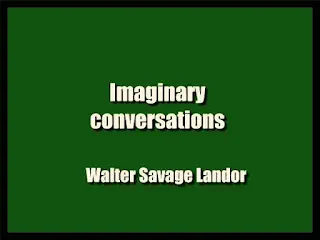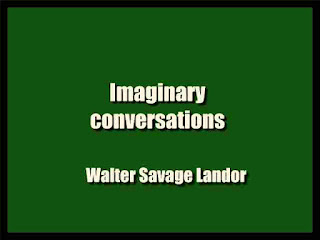Download Imaginary conversations - PDF by Walter Savage Landor (1886)
Imaginary conversations
Excerpt:
Landor will always be a great figure in English literature. His is an Olympian form, like Milton's, solitary, it is true, but he stands on " the far eastern uplands," fairly beyond the ebb and flow of time. Born into the midst of the second flowering-time of our national literary energy,* Landor was isolated from the first by the necessity of his own proud and imperious temperament. During a period of literary activity extending over seventy years, he slowly built up the life-work that now finds a more or less inaccessible home in the stately volumes of Forster's final edition.
He was a poet embodying revolutionary aspirations in classic and concrete language; he was a critic in the largest sense, a critic of life and of the human spirit as it is expressed in literature, a patient and unwearied critic of language; above all, he was what we may for the moment, for want of a better term, consent to call him with * Wordsworth, Scott, Coleridge, Southey, Lamb, Hazlitt, Leigh Hunt and De Quincey were all born during the years between 1770 and 1785. During some period Chatterton, Gray, Goldsmith and Johnson died. Byron, Shelley, Carlyle and Keats were born a few years later. Browning, " a great dramatic poet." His Examination of William Shakspere for deer-stealing is marked by its individual power and solemn deliberate humour; in the Pentamero? Boccaccio and Petrarch discourse together in delightful old-world fashion; Pericles and Aspasia is full of glimpses of Greek life mingled with Landorian wisdom. But it is in the Imaginary Conversations, elaborated during the thirty most mature years of his life, that Landor has given us most of himself. As was said many years ago, a well-edited selection of the Conversations would be " one of the most beautiful books in the language — that is to say, in the world." In these Conversations, a great procession of noble and gracious forms, of olden times and of a later day, pass sweetly or sadly before us. Hannibal supports the dying body of his enemy Marcellus and exclaims
"What else has the world in it?" Chaucer and Boccaccio dine together at the house of Messer Francesco Petrarca, and tell each other stories in the manner of old time; large wise sayings mixed with kisses fall from the lips of Epicurus as he talks philosophy with his girl- pupils in the garden outside Athens; Garibaldi and Mazzini laugh sadly together over " French honour, French veracity;" the dignified Bossuet respectfully advances to hear the con- fession of his king's volatile young mistress; Cicero and his brother discourse together in lofty Ciceronian ways of life and death and fame; Leonora di Este implores her imprisoned lover Tasso to forget her, and dies with a happy smile, receiving the assurance that he can never forget Montaigne in his wise and genial way laughs quietly at the stiff and learned Scaliger; Ascham warns his young pupil Lady Jane Grey of the perils of greatness; Pericles leads Sophocles through the Athens that he has adorned, and delights more than all in the voices that praise him for his friends' sake; Leofric rides into Coventry with his young bride Godiva, so resolute to save the city; Joan of Arc strives to stir Agnes Sorel's weak heart to heroism; Washington and Franklin discourse of the free spirit of New England; the Empress Catharine stands outside the door, hears the dogs lapping her murdered husband's blood, and seeks to justify LANDOR. ix herself; Sir Philip Sidney and Greville talk of poetry amid the woods of Penshurst; Beatrice receives her lover's last kiss with " Dante! Dante! they make the heart sad after " — such are the forms — and how many more! — that Landor with his unfailing instinct for what is heroic or tender has brought before us in these Imaginary Conversations.
Contents:
Marcellus And Hannibal
Queen Elizabeth And Cecil.
Tiberius And Virsania
Epictetus And Seneca.
Peter The Great And Alexis
Louis Xiv. And Father La Chaise
Henry Viii. And Anne Boleyn
Joseph Scaliger And Montaigne
Boccaccio And Petrarca
Metellus And Marius ....
Bossuet And The Duchess De Fontanges
John Of Gaunt And Joanna Of Kent.
Lady Lisle And Elizabeth Gaunt.
Empress Catharine And Princess Dashkov
Leofric And Godiva ....
Essex And Spenser ....
William Wallace And King Edward I.
Archbishop Boulter And Philip Savage
Lord Bacon And Richard Hooker
General Lacy And Cura Merino
Oliver Cromwell And Walter Noble
Lord Brooke And Sir Philip Sidney.
Southey And Porson...
The Abbe Delille And Walter Landor
Diogenes And Plato...
Barrow And Newton...
Scipio, Polybius, And Pan^etius .
Pav1d Hume And John Home
Alfieri And Salomon The Florentine Jew
Rousseau And Malesherbes
Lucullus And Cesar...
Epicurus, Leontion, And Ternissa
Marcus Tullius And Quinctus Cicero.
Author: Walter Savage LandorMarcellus And Hannibal
Queen Elizabeth And Cecil.
Tiberius And Virsania
Epictetus And Seneca.
Peter The Great And Alexis
Louis Xiv. And Father La Chaise
Henry Viii. And Anne Boleyn
Joseph Scaliger And Montaigne
Boccaccio And Petrarca
Metellus And Marius ....
Bossuet And The Duchess De Fontanges
John Of Gaunt And Joanna Of Kent.
Lady Lisle And Elizabeth Gaunt.
Empress Catharine And Princess Dashkov
Leofric And Godiva ....
Essex And Spenser ....
William Wallace And King Edward I.
Archbishop Boulter And Philip Savage
Lord Bacon And Richard Hooker
General Lacy And Cura Merino
Oliver Cromwell And Walter Noble
Lord Brooke And Sir Philip Sidney.
Southey And Porson...
The Abbe Delille And Walter Landor
Diogenes And Plato...
Barrow And Newton...
Scipio, Polybius, And Pan^etius .
Pav1d Hume And John Home
Alfieri And Salomon The Florentine Jew
Rousseau And Malesherbes
Lucullus And Cesar...
Lucullus And Cesar...
Epicurus, Leontion, And Ternissa
Marcus Tullius And Quinctus Cicero.
Marcus Tullius And Quinctus Cicero.
Publication Date:(1886)










